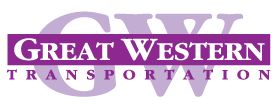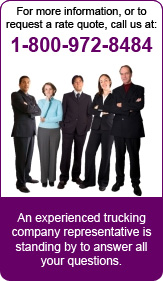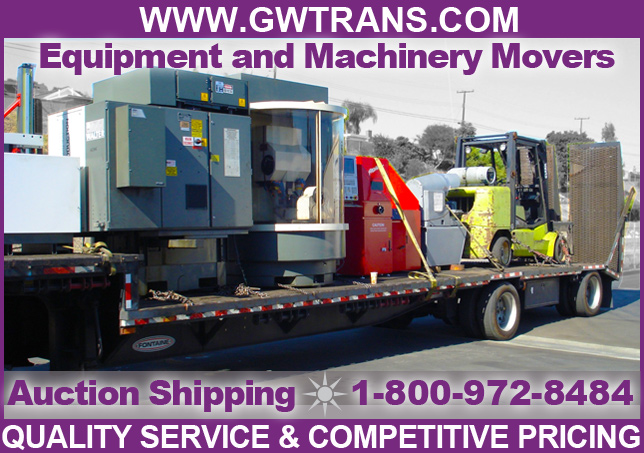Going Once, Going Twice. SOLD!
Q: Who has the responsibility to arrange and pay for the shipping on items sold at auctions?
A: The winning bid buyer is responsible for coordinating the pick up and the shipping of the equipment from the auction’s location or seller’s location. The auction company always provides auction yard contact information or item’s location and the removal terms.
The overall auction concept is simple and has been around for centuries, when you need to sell a valuable commodity, it’s better to have more than one bid and possible buyer. This makes auctions ideal for sellers to realize the optimal price.
Why are auctions ideal for equipment purchasers too?
Public auctions are no longer exclusively used for the purpose of selling older worn out equipment or to satisfy back payments on loans. In today’s business asset market, the auction method of marketing is viewed by both sellers and buyers as their first choice of exchange. Auctions are no longer the choice of last resort or an option being forced by legal proceedings.
Auction companies are aware that customers and clients have unique situations and needs that must be addressed. Whether their assets are business, residential, agricultural or commercial equipment. Whatever your situation, the auction method of marketing is a simple concept that can yield you the best opportunity to create the most ideal market to sell your assets.
Major internet auctioneers provide online auction solutions for the heavy equipment, trucking, manufacturing and machinery industries. On line auctions are set up for easy usage by the users, featuring industry specific online bidding systems that broadcast auctions from locations around the world and streams directly to a bidder’s computer.
When bidders can’t make it to the auction site, they simply log on to an on line auction website to attend the auction virtually. On line auction services benefit both sellers and buyers because their system makes it very simple for high numbers of bidders around the world to attend the auction, resulting in an increase of participants per sale.
The major online auction companies’ bidding system provides an easy to use alternative to being on-site at an auction. Some auctions allow for you to see live HD video, hear live audio, browse through multiple pictures of each lot, and directly communicate with the auction clerks. In most cases to place a bid, you click the “Bid” button when you agree to the asking price, this is just like raising your hand at an on-site auction.
Before participating at an auction it is best to only observe the auction once or twice before. By only observing you will learn the details and the dynamics of the auction process. Only once you are truly comfortable with the auction process then you should participate for real with money!
Congratulations, you are the successful bidder of an auction item. Now all you have to do is pay any outstanding balances and safely transport the newly purchased asset to its new location.
How do I pay at an auction?
*US Currency
*Money Orders
*Certified Checks (drawn on US banks only)
*Company Checks (drawn on US banks only)
*Company checks are only acceptable if accompanied by a letter from the payor’s bank guaranteeing unqualified payment to the auction company.
All checks should be made payable to the auction company name
*Wire Transfer
Once you have paid any outstanding balances auction companies have “Removal Policies”.
Auction companies do not in most cases pack, ship, store, crate or rig items.
Buyers may either pick up their items at the designated auction site personally or can arrange for a third party trucking firm to manage the removal process for them. If someone other than the registered buyer at the sale is designated to pick up the purchased assets, the buyer must:
1) Contract with an independent trucking firm or other representative who will dismantle, crate, pack, or ship your purchased items.
2) Coordinate the removal of those purchased items to meet the time deadlines indicated on the “Removal Terms” of the auction company.
3) Submit an “Agent Release Authorization” form which will allow the auction company to release the items to a third party trucking company for shipping, crating or packing purposes. Since auction companies do not ship the items, they do not obtain/prepare any export licenses/documents.
In most cases the auction company is not affiliated with any specific machinery rigging, trucking company or export company. Auction companies provide the buyer the trucking company names and contact information of available trucking companies solely as a convenience to their buyers. Auction companies do not endorse or guarantee the services of any machinery rigging, trucking company or export company, and will not be held responsible for any damage, omission or other problems incurred as a result of the actions of those companies. Buyers are encouraged to research and utilize a trucking company of their selection, provided the trucking company will supply the auction company with the required forms and insurance certificates. Buyers and riggers of large machines must provide the auctioneer with a “Certificate of Insurance” in various amounts depending on the auction company prior to removal. The amount is generally $1,000,000 but check with the auction company for the exact amount.
Check out of the merchandise will begin at the sale’s conclusion or at a time after the auction has ended.
The auction removal process
All purchases must be removed no later than the date specified in the auction terms, the “Equipment Removal” section on most auction websites and/or in the auction terms will list these dates. Generally items cannot be removed during the sale.
In most cases the items are sold “AS IS WHERE IS”. Removal is the expense, risk and liability of the buyer. Purchases are released only on presentation of paid in full bill. Generally the auction company is not responsible for goods not removed within the time allowed, but in some cases the auction company will remove and store the items at the expense and risk of the buyer for any item purchased, but not paid for and removed within the time that was agreed upon.
Auction companies require that you use an appropriately equipped transport vehicle and secure the merchandise for safe transportation. If a vehicle shows up for pick up that you have arranged and it is determined that it is not the proper trailer type or equipment to be used for transportation, the truck will be rejected.
Great Western Transportation trucking service has been working with buyers and sellers of machinery, equipment and over dimensional items purchased at an auction. They are knowledgeable about the type of trailer that is required to safely transport the items.
Auction Sellers
Are there items you haven’t sold because of shipping hassle and uncertainty?
Auction companies and sellers understand that buyers are more likely to purchase an item that has a predetermined shipping cost. The professionals at Great Western Transportation can provide accurate shipping estimates for even your most challenging over sized or overweight heavy industrial machinery.
With shipping quotes before the sale – you’ll sell more!
Auction Buyers
Great Western Transportation will make the purchasing process easier because they take the guesswork out of the shipping cost before you buy, knowing the shipping estimates.
How to determine what service(s) you need?
Most assets purchased at auction are not prepared, packaged or otherwise ready for shipment upon pickup. Assets are generally sold from commercial environments and are in “AS IS WHERE IS” condition. As an auction buyer, you may require of one or more services to collect, prepare and ship your purchases. Below is a list of common services you may need:
Machine Moving / Rigging
Large, complicated machinery may need to be disconnected, disassembled, and loaded onto flatbed trucks or into dry vans. Riggers (Millwrights) can provide these services and may also be assist in documenting the dismantling process and labeling connections in order to make set up and reconfiguration easier on the receiving end.
Freight Forwarders / Carriers
Once assets are packed or crated, they need to be prepared for the carrier of choice: forms filled out, pickup appointment scheduled, and physical hand-off to the carrier’s flatbed trailer or dry van. A transportation consultant at Great Western Transportation will provide the selection of the particular type of flatbed trailer.
Shipping / International Transportation
Ocean container transportation across international borders usually involves the additional complexities of specially prepared documents that enable goods to pass customs checkpoints without penalties or delays. Also known as an intermodal container, the ocean container is used to ship industrial machinery overseas all the time.
Inspecting Your Delivery
After your machinery has shipped, some auction companies’ customer service will e-mail or mail you a copy of the signed “Bill of Lading” as well as shipping pictures as a confirmation that the equipment has been prepared for shipment and loaded onto the truck. This allows you to make sure your pictures and shipment description match what you have received. Auction companies assume no liability for damages incurred during transport and claims need to be made directly with the trucking company.
If there is any freight damage or discrepancies in the number of pallets or units, it is important to note your findings on the Bill of Lading prior to accepting the shipment and the truck driver should assist you in contacting the carrier’s business office to begin the claim filing process. At the receiving location be sure to have the proper equipment and/or personnel necessary to safely unload the equipment. It may be to your benefit to arrange for a local rigger capable of unloading and assembling the equipment in order to avoid damage to the unit you have purchased. Minor nicks, scratches, scuffs, and abrasions are common for large machinery and equipment deliveries. These do not affect the operation of the equipment.
Most types of heavy metalworking equipment that will require dry van or flatbed trailers to ship from auctions.
Examples of metalworking, fabricating and chip making machinery are:
- Boring Mills
- Grinders
- Inspection Equipment
- Iron Workers
- Lathes
- Milling Machines
- Plate Rolls
- Press Brakes
- Punch Presses
- Saws
- Shears
- Welder Equipment and much more.
Past auction catalogs are easily available on line for a particular auction house. Thus, you may research the catalogs to see if the auction company has auctioned similar items before. The following is a more comprehensive list of what you may be able to find at an industrial auction.
- Air Compressors and Air Dryers
- Assembly & Fabrication Equipment
- Cabinets and Shelving (Industrial Grade)
- Carts
- Chillers & Cooling Towers
- Circuit Breakers (Air, Vacuum, & Molded Case)
- CNC Lathes and Milling Machines
- Complete or Partial Assembly Lines
- Complete or Partial Data Center Acquisition
- Complete Plants (Real Estate, Usable Equipment, and Plant Liquidations)
- Conveyor Chain and Parts
- Conveyor Systems
- Cryogenic Tanks
- Data Center Equipment
- Dust Collectors and Bag Houses
- Electric Motors
- Electrical Equipment
- Electrical Generators
- Electrical UPS Systems
- Electronic Controls (PLC, Variable Frequency Servo Drives VFD, Panelviews, & More)
- Forklifts & Material Handling Equipment
- FSI and other Filter Pots (Cartridge Housings)
- Fusible Switches, Bus Plugs, Bus Way
- Heat Exchangers
- High Efficiency Industrial Lighting
- Hydraulic Pumps
- Industrial Boilers
- Industrial Bridge Cranes
- Industrial Gear Reducers
- Industrial Presses
- Industrial Pumps, Tanks
- Light Curtains and Manufacturing Safety Equipment
- Machining Equipment
- Man-Lifts
- Manual Machining Equipment (Lathes, Milling Machines, Grinders, Saws, etc.)
- New In Box Bearings
- Obsolete or Overstock Spare Parts
- Paint and Finishing Systems
- Paint Equipment (Booths, Sprayers, Guns, Mixers, Graco, etc.)
- Pallet Racking
- Powder Coating Equipment (Booths, Sprayers, Guns, etc.)
- Propane Tanks
- Reverse Osmosis (RO) Water Systems
- Robotic Equipment (Complete Robots and Robot Parts)
- Shrink Wrapping Machines
- Substations
- Telecom Equipment (Obsolete and New)
- Transformers
- UV Water Systems
- Vaporizers
- Vehicles
- Water Treatment Equipment (Sand Filters, Filter Pots, etc.)
- Welding Equipment (MIG, TIG, SPOT, & STUD)
Researching past auction catalogs and results can provide you some insight into the items you wish to purchase and provide you with the weight and dimension measurements.
Once you have accurate weight and dimensions, the staff at Great Western Transportation will know immediately what type of trailer or dry van you will need. Great Western Transportation has vast background in assessing trailer requirements based on the overall dimensions and weight of the item you will be shipping.
Let us prove to you that Great Western Transportation is your Premier Trucking Service.
Call us for information about our trucking services or for a rate quote.
Great Western Transportation 5000 Pleasanton Ave, Suite 145 Pleasanton, CA 94566






